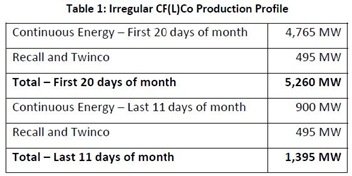The Newfoundland and Labrador government is making quick changes to a 2008 law after lawyers for the Churchill Falls (Labrador) Corporation - CF(L)Co – raised questions about the impact of the bill on the company’s 1961 lease and rights to all property related to Churchill Falls.
Lawyers for CF(L)Co raised the issue with the provincial government’s NALCOR Energy company during talks on water management for the proposed Lower Churchill project.
The changes were tabled Tuesday in an emergency sitting of the House of Assembly.
It appears that - reminiscent of the 1980 water rights reversion bill - the 2008 bill stripped CF(L)Co of its lease.
In the original 2008 bill - Energy Corporation of Newfoundland and Labrador Water Rights Act - the Lower Churchill River is described as including “all waters that originate within the Churchill River catchment area and all rivers that naturally flow within the catchment area or from diversions into the catchment area.”
Clause three of the then stated that
any property in and rights to the use and flow of water, previously conferred by a grant, lease, licence or other instrument or under a statute of the province, or vested in, acquired by or accruing to a person by whatever means relating to the Lower Churchill River are extinguished. [Emphasis added]
By combining the two clauses, the new bill effectively cancelled the 1961 Churchill Falls lease. The 2008 law also blocked rights holders from any legal action and stripped them of any entitlement to compensation.
The bill became law on June 4, 2008. There is no indication when cabinet issued the license to the energy corporation, now known as NALCOR Energy.
The changes introduced in Tuesday’s emergency session make it plain that the 2008 water rights law applies only to the Lower Churchill and that, for absolute certainty, the 2008 bill “ excludes the area described in Appendix A to The Churchill Falls (Labrador) Corporation Limited (Lease) Act, 1961, and all waters while they are in that area.”
Emergency sessions are rare
For its part, the Williams administration is downplaying the session and the hasty changes. In a news release, Dunderdale said that the act was never intended to cover Churchill Falls.
But the very fact the session was called to deal with one set of amendments to one bill suggests the issues involved are far from routine and that the legal implications of the water rights bill would be significant if left unamended.
Emergency or special sessions occur very rarely and usually only deal with extraordinary issues like war or labour disputes that threaten public health and safety.
Ordinarily – and if the implications of the bill were considered inconsequential or inadvertent - CF(L)Co and NALCOR could simply have made routine amendments in the regular fall sitting a condition of an overall deal on water rights management on the Churchill River.
Interestingly, the provincial government also tried to downplay the water rights bill in 2008, even to the point of making apparently misleading statements in the legislature.
In June 2008, natural resources minister Kathy Dunderdale told the House of Assembly that the bill was needed since government had decided against using the Lower Churchill Development Corporation as the vehicle to develop the Gull Island and Muskrat Falls power projects.
But the 2008 water rights bill didn’t repeal the 1978 Lower Churchill Development Act, nor did it remove the LCDC option for development of the Lower Churchill. The 2008 bill merely extinguished previously existing rights, leases, grants and licenses.
Deja vue
This marks the second time since 1975 that a Progressive Conservative administration in Newfoundland and Labrador has found itself in hot water over legislation related to Churchill Falls.
In 1980 Brian Peckford’s administration introduced the Upper Churchill Water Rights Reversion Act. The bill expressly cancelled the 1961 lease. A subsequent legal challenge by creditors led to a landmark decision by the Supreme Court of Canada that ruled the 1980 statute was illegal.
One of the influential factors in that case was public comments by politicians that identified the real purpose of the bill as being to undo the 1969 Churchill Falls agreement.
If the 2008 water rights bill effectively expropriated the Churchill Falls complex, it would be the second such move by the Williams administration in 2008. In December 2008, the Williams administration moved to seize assets of Abitibi, Enel and Fortis including hydro-electric generating facilities.
Confusion reigns in hydro policy
Revelation of the 2008 water rights ploy is the fourth Lower Churchill-related blockbuster news in a week.
On Friday, natural resources minister Kathy Dunderdale revealed that the provincial government had been trying unsuccessfully for five years to interest Hydro Quebec in an ownership stake in the Lower Churchill project.
Dunderdale told Open Line Show host Randy Simms and his audience that the provincial government proposed to “set the Upper Churchill [issue] to one side.”
This move came despite commitments by Premier Danny Williams that there would be no Quebec involvement in the Lower Churchill without redress for the appalling 1969 deal that sees Hydro Quebec buy electricity at better than 1/30th the cost for which it is sold to consumers. Williams has repeatedly railed against the 1969 deal as an example of a resource give-away by previous provincial governments.
The offer of an ownership stake to Hydro Quebec also flies in the face of Williams’ 2006 commitment to develop the Lower Churchill without any outside help:
"It's an opportunity for us to get back some of what we've lost on the Upper Churchill, and the fact that we're going to do this alone is significant," Williams said in an interview.
The Dunderdale revelation came after Williams accused Hydro Quebec of doing everything possible to block the Lower Churchill project.
Williams also said last week that his government would no longer plan to string hydro lines from the Lower Churchill through a UNESCO World Heritage site.
-srbp-

